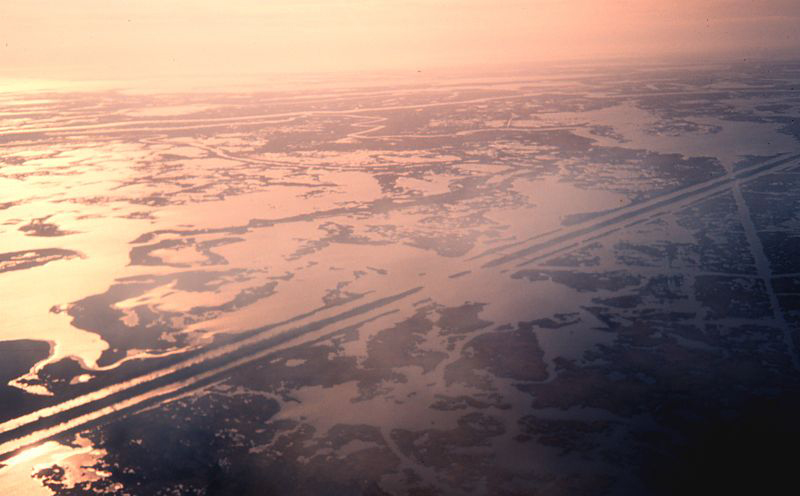
The political commentariat thinks Big Oil might cut a deal.
Environmental lawsuits filed by levee boards and parishes might force oil and gas firms to the negotiating table, according to columnist James Gill. A “grand bargain” to fix the coast might be possible, claims Gambit political editor Clancy DuBos. Despite appearances, writes political analyst John Maginnis, Gov. Bobby Jindal actually approves of (some) of the legal action as a step towards a settlement with the oil industry.
Wow! This is such a tantalizing and extraordinary development, given the state’s longtime fealty to energy interests, that it’s difficult to believe. If the oil industry agreed to repair the wetlands they helped slice and dice, and if they dedicated future income to fund the state’s coastal Master Plan, without a knock-down, drag-out legal fight, that would be “totally epic,” as the kids say.
One thing is for certain: there is now more political momentum towards a deal to force Big Oil to fix the coast they helped shatter than at any other time in recent memory.
If this can suddenly come together — and that “if” seems to be getting smaller, not larger — author and ousted levee board member John Barry will be responsible for a political miracle. It was Barry who got the ball rolling in July when he launched the suit against 97 oil, gas and canal firms that was filed by the Southeast Louisiana Flood Protection Authority-East. Barry was then the authority’s vice chairman, and argued persuasively that oil and gas must atone for past coastal sins and fund the plan to reclaim South Louisiana from the sea.
Gov. Bobby Jindal’s office was unenthused. The governor’s coastal reclamation honcho, Garret Graves, blamed Barry’s lawsuit for mucking up some undisclosed super-secret strategy to obtain restoration funds. Jindal made no secret of his hope that a nominating committee would replace Barry on the board, and when that happened, it seemed that the flag of Texaco was flying high in Baton Rouge.
But the political script was rewritten last week when the parishes of Jefferson and Plaquemines also filed lawsuits against oil companies. Instead of Barry being some deluded coastal Quixote who needed to be scolded for his insolence by a governor friendly to Big Oil, now Barry looked like the prime mover behind a line of falling dominoes. Lawsuits will beget lawsuits, and oil firm executives will be forced to the bargaining table, Barry predicted earlier today at The Lens’ inaugural “Breakfast with the Newsmakers” event.
Most revealing of all, perhaps, was the Jindal administration’s lack of apoplexy over the parish lawsuits. Maginnis contends Jindal wasn’t as opposed to court action as he first appeared. He simply wanted more control over the litigation and negotiations. He gets it with the parish lawsuits, Maginnis notes, because they are suing as coastal zone regulators and share regulatory authority with the state Department of Natural Resources. Above all, Jindal wanted position himself to take the credit if a settlement were reached.
As the legendary Special Man from Frankie and Johnny’s Furniture Store would say: Let him have it!
Barry already spent thousands of words essentially appealing to Jindal to take the credit. Take the lead on Louisiana’s great existential issue. Guide the conversation about coastal accountability. Preside over a “grand bargain” in which a booming industry would concede a slice of its enormous profits to the equally enormous costs of the Master Plan. Do these things, Barry wrote, and Jindal can become perhaps “the greatest governor in Louisiana’s history.”
It’s an incomprehensible prospect (on so many levels). But heck, if Nixon can go to China, perhaps Jindal can go to Chevron.
One thing is for certain: there is now more political momentum towards a deal to force Big Oil to fix the coast they helped shatter than at any other time in recent memory.
A few months ago Yancey Duplantis of Hornbeck Offshore, a transport firm that services the petroleum industry, responded to the levee board’s lawsuit by saying: “Negotiation, not litigation, is the answer.”
Amen!

